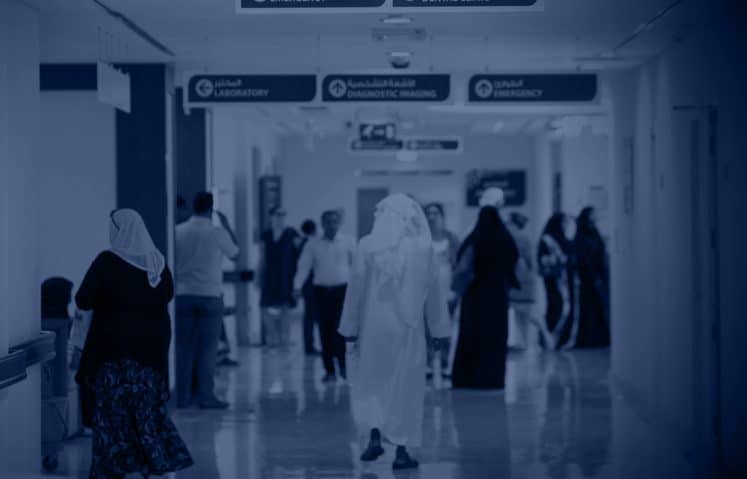Monday, 2024-04-08
Moving towards a world-class healthcare system that’s fit for the next 50 years By Dr. Gareth Goodier

The healthcare sector is one of the most fascinating, complex and rewarding industries to work in. Not only do we have the opportunity to save lives but we can also foster scientific and technological advances that only a few years ago would have been unimaginable.
Before the start of this year’s Arab Health, it is worth reminding ourselves how far Abu Dhabi and the region’s healthcare sector have come. We have seen world firsts in transplant. We have witnessed the development of world-class hospitals and a medical infrastructure that is on par with the best available. And we are saving lives, delivering holistic health care and developing skills in a future-focused industry.
Take the Sheikh Shakhbout Medical City, a joint venture between Abu Dhabi Health Services (Seha) and Mayo Clinic, the global leader in medical care, education and research. This incredible facility is the largest tertiary hospital in the UAE and aims to elevate the provision of healthcare services in the nation under the mandate of the Abu Dhabi Economic Vision 2030.
The healthcare sector is one of the most fascinating, complex and rewarding industries to work in. Not only do we have the opportunity to save lives but we can also foster scientific and technological advances that only a few years ago would have been unimaginable.
Before the start of this year’s Arab Health, it is worth reminding ourselves how far Abu Dhabi and the region’s healthcare sector have come. We have seen world firsts in transplant. We have witnessed the development of world-class hospitals and a medical infrastructure that is on par with the best available. And we are saving lives, delivering holistic health care and developing skills in a future-focused industry.
Take the Sheikh Shakhbout Medical City, a joint venture between Abu Dhabi Health Services (Seha) and Mayo Clinic, the global leader in medical care, education and research. This incredible facility is the largest tertiary hospital in the UAE and aims to elevate the provision of healthcare services in the nation under the mandate of the Abu Dhabi Economic Vision 2030.
For a nation that is just short of 50 years old, this is a remarkable achievement and will have a major impact on the provision of advanced and complex health care for the community. Yet, it is equally important to remind ourselves that there are still significant challenges.
The World Health Organisation, for instance, estimates that a third of the adults in the UAE are obese, and one out of five people live with diabetes. Sedentary lifestyle issues, common across much of the developed world, are acutely felt in the UAE and sadly storing up major challenges for the future. Added to this people are living longer, requiring more complex care as they get older, and technological advances are driving increased costs.
All of this is putting pressure on healthcare systems, from both operational and budgetary perspectives. In a recent forecast, health expenditure is expected to rise to $26 billion (Dh95.5 billion) by 2028, accounting for 3.6 per cent of the country’s gross domestic product, according to Business Monitor International.
These are challenges felt across all healthcare systems and Abu Dhabi is not alone in grappling with the best model for the future. It is therefore imperative to deliver on the mandate the government has empowered us to realise: a health system fit for the 21st century that puts patients first; healthcare professionals raising the bar for healthcare quality; and adoption of innovative technologies for prevention as well as treatment of diseases.
Here in the UAE, we are fortunate to have a visionary leadership that has placed health care at the heart of its plans for development and the care of its people. However, the system has grown quickly and is complex.
An active and dynamic private sector has created more choices, introduced new services and played a role in shaping patient expectations, while the public sector has continued to invest and grow in line with the needs of the community.
So in a year aptly defined by the government as the Year of Planning, ensuring that we have a healthcare sector that is able to support the ambitions set out by the nation’s leadership, now and for the next 50 years, requires reflection on where we can do better.
It is this challenge that inspired me to join Seha to help strategically shape the organisation in its next phase of development. It is an exciting time to be involved in health care in Abu Dhabi and the UAE.
Ongoing initiatives are focused on improving healthcare quality and on adopting patient-centric models for an optimised experience. Take Seha’s partnership with the Department of Health and Abu Dhabi-based artificial intelligence and cloud computing company, Group 42, to spearhead the national genome programme launched in December 2019, which will use large-scale data to improve the health and well-being of Abu Dhabi residents. This is just one example of the advances the industry is making.
It is projects like this, as well as the ground-breaking SSMC, that are helping realise the opportunity we now have.
As we embark on another Arab Health, thinking about the future will be a central focus, both in terms of the technological and therapeutic advances we are embracing, as well as the structural challenges and trends we are navigating.
With the support and leadership of the government, our commitment at Seha is to drive quality and value in the healthcare sector, keeping the patients at the heart of everything we do.